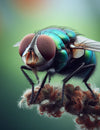
Cockroaches are a group of insects that have been around for millions of years. There are over 4,500 known species of cockroaches, but only about 30 of them are associated with human habitats. These insects are found all over the world and are known for their ability to survive in almost any environment.
Cockroaches are often considered pests because they can cause damage to property and can spread disease. They are attracted to food, water, and warmth, which is why they are commonly found in kitchens, bathrooms, and other areas of the home.
Despite their reputation, cockroaches are fascinating creatures with unique characteristics. They have the ability to regenerate limbs and can survive for weeks without food or water. In this article, we will explore some of the basic information about cockroaches, including their anatomy, behavior, and habitat.
Do Cockroaches Bite? Exploring the Facts and Myths
There is a common belief that cockroaches bite humans, but the truth is that they very rarely do. Cockroaches have mandibles, or mouthparts, that are designed for chewing and not biting. While they may nibble on food or other materials, they do not have the ability to bite human skin.
However, it is possible for a cockroach to bite a human in rare circumstances. If a cockroach feels threatened or cornered, it may use its mandibles as a defense mechanism and bite in self-defense. Additionally, if there is a shortage of food, cockroaches may resort to biting to obtain nutrients.
It is important to note that cockroach bites are not dangerous and typically do not require medical attention. In fact, many people may not even realize they have been bitten. Nonetheless, it is still important to prevent cockroach infestations to avoid the risk of diseases they may carry and to minimize the overall nuisance they cause.
What Happens when a Cockroach Bites: Symptoms and Risks
When a cockroach bites a human, it typically causes mild irritation and discomfort. The bite may leave a small mark on the skin, like a mosquito bite, and can be accompanied by redness, swelling, and itching. In rare cases, some people may experience an allergic reaction to the cockroach bite. Symptoms of an allergic reaction can include difficulty breathing, hives, and swelling of the face, tongue, or throat. If these symptoms occur, seek medical attention immediately.
While cockroach bites are not generally considered a serious health risk, cockroaches can carry harmful bacteria and pathogens on their bodies and can spread diseases through contamination. They can also trigger allergies and asthma in some people.
Preventing cockroach infestations is key to minimizing the risks associated with cockroach bites. This includes keeping the home clean and free of clutter, sealing up any cracks or gaps where cockroaches can enter, and removing sources of food and water that may attract these pests.
The Difference Between Cockroach Bite and Sting
Cockroaches do not sting; rather, they have mandibles that they use for chewing and biting. When a cockroach bites, it leaves a small mark on the skin similar to a mosquito bite. The bite may cause some mild irritation and discomfort, but it is generally not a serious health concern.
In contrast, some other insects, such as bees and wasps, have stingers that they use to inject venom into their victims. Stings from these insects can be painful and, in some cases, can cause severe allergic reactions that require medical attention.
It is important to note that while cockroaches do not sting, they can still pose a health risk by spreading diseases and allergens through contamination. Therefore, it is important to take measures to prevent cockroach infestations in the home, including keeping the environment clean and free of clutter, sealing up any cracks or gaps, and removing sources of food and water that may attract these pests.
Can Cockroach Bites and Stings be Prevented?
Since cockroaches very rarely bite humans and do not sting, the focus of prevention efforts should be on preventing cockroach infestations in the home. By doing so, you can minimize the risk of exposure to the harmful bacteria and pathogens they may carry, as well as reduce the overall nuisance they cause.
Here are some steps you can take to prevent cockroach infestations:
- Keep your home clean and tidy, and regularly clean up any food or drink spills.
- Store food in airtight containers and keep it off the floor.
- Seal up any cracks or gaps in your walls, floors, and doors where cockroaches could enter.
- Repair any leaks or sources of standing water to eliminate sources of moisture.
- Dispose of garbage regularly and keep your outdoor trash cans tightly sealed.
- Use screens on windows and doors to prevent cockroaches from entering.
By following these simple steps, you can significantly reduce the risk of cockroach infestations in your home and minimize the potential harm they may cause.
Conclusion: Cockroaches are not just a Nuisance but a Health Hazard.
In conclusion, while cockroaches may be seen as a common household pest, they can pose serious health risks to humans. Cockroaches can spread harmful bacteria and pathogens through contamination, trigger allergies and asthma, and in rare cases, bite humans.
To prevent cockroach infestations, it is essential to keep the home clean and free of clutter, seal up any entry points, and eliminate sources of food and water. Using a cockroach killer gel can also be an effective way to control and eliminate cockroach populations. However, it is important to read and follow the instructions carefully and use these products safely, as they contain chemicals that can be harmful if misused.
Overall, taking steps to prevent cockroach infestations is essential to protecting the health and safety of your family. By keeping your home clean and using effective pest control measures, you can minimize the risks associated with cockroaches and enjoy a healthier and more comfortable living environment.



